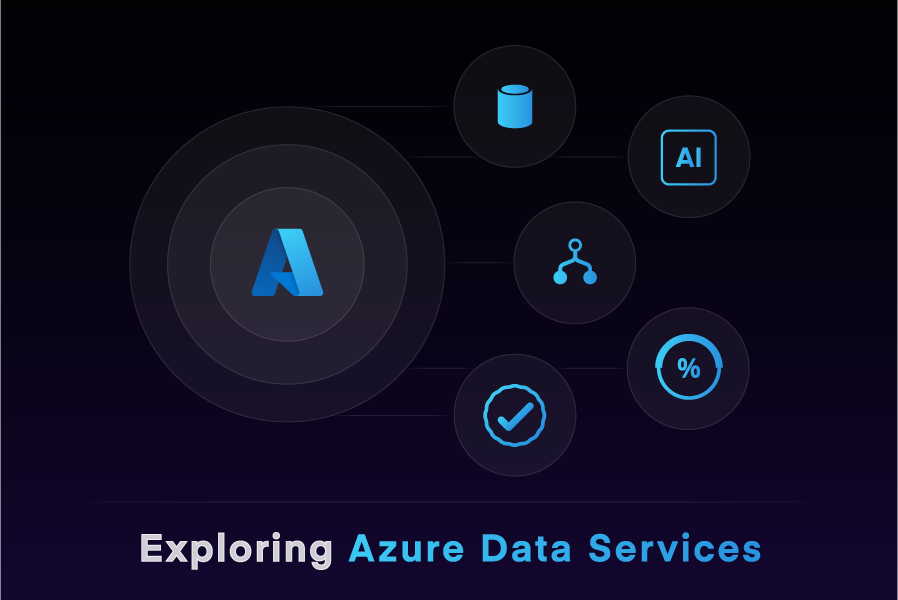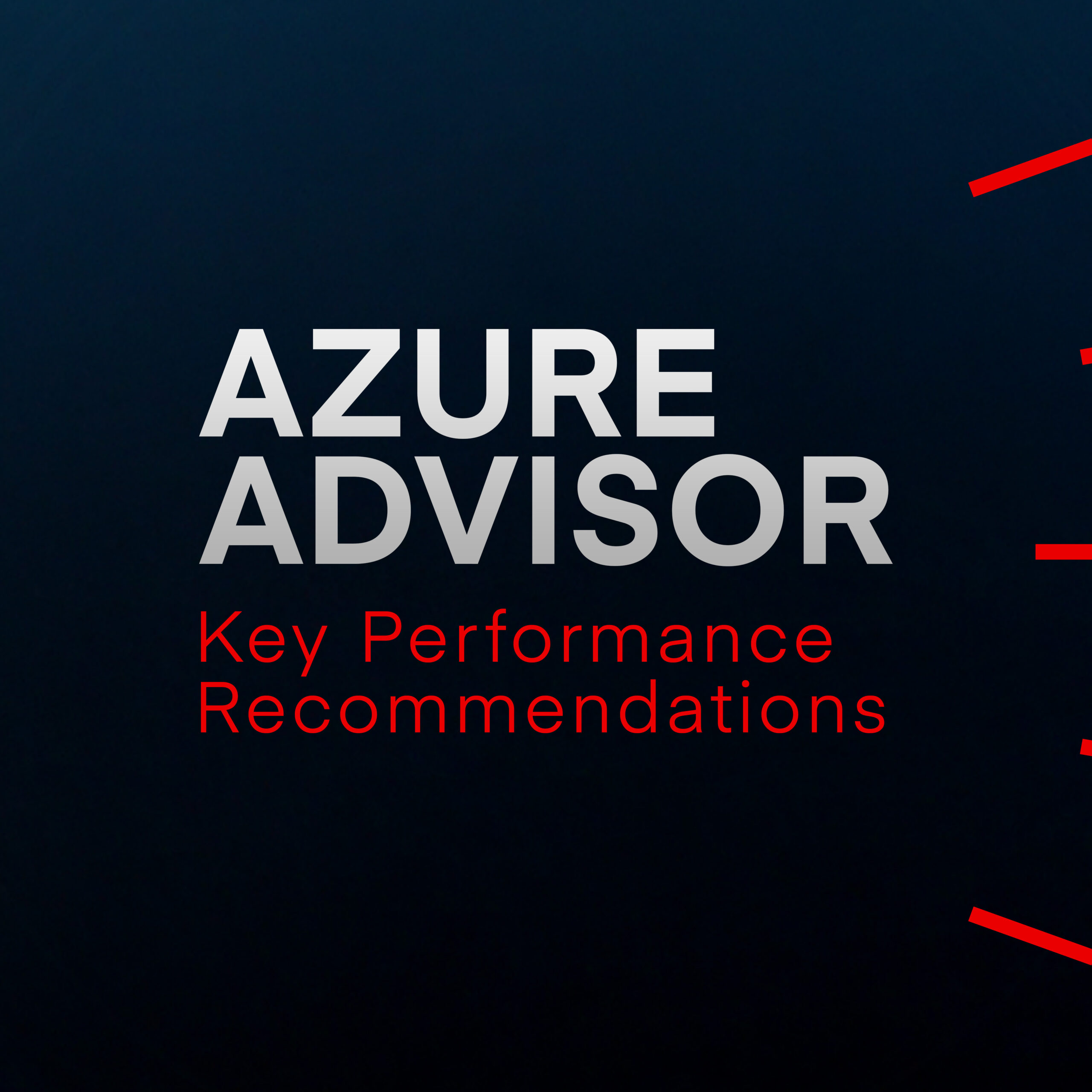
We all know data is at the heart of how businesses make decisions these days, whatever their size or industry. And modern tech has enabled some great possibilities for collecting it.
But managing, moving, and making sense of all that data? That seems like a whole other problem to solve. And this is where Azure steps in. Microsoft has packed Azure with powerful tools that let you store, integrate, analyse, and get insights from your data – without needing the scale of a massive enterprise. In this guide, we’ll walk through the essentials of Azure’s data services and how they can make a big difference for your business.

-
Databases & scalable storage
When it comes to managing and storing your data, Azure has a range of services that cover everything from traditional databases to complex big data scenarios. Here’s a look at how they work and where they fit in:
Azure SQL Database
Imagine running an e-commerce platform that needs mission-critical, real-time data access without downtime. Here, Azure SQL Database can be used as a fully managed relational database. It eliminates the headaches of patching, backups, and scaling, as Azure handles these automatically. Whether you’re migrating from legacy on-premises SQL Server databases or looking to simplify database management, this service offers built-in high availability, backups, and security. Its compatibility with existing SQL workloads means your team won’t need to re-skill. It’s like SQL Server but turbocharged for the cloud era.
Use case: A retail company might migrate a legacy SQL Server database to the cloud, where uptime and real-time order processing are paramount. Azure SQL Database can scale up automatically during high-traffic periods and reduce resources during quieter times, optimising costs.
Azure Cosmos DB
For applications that need real-time global data distribution, you’ll want to consider Cosmos DB. It’s designed for fast, low-latency access from any corner of the world, which is massively important for businesses operating across multiple regions. For example, a global logistics company might need all depots and offices to have instant access to real-time inventory data, regardless of where they’re located. Cosmos DB supports this with sub-10 millisecond reads and writes across the globe. The nice part is that you don’t have to manage the complexities of replication and failover – Azure handles all this for you.
Use case: A fintech company processing millions of transactions per second across different regions, ensuring that every transaction is immediately available for fraud detection and reporting, regardless of the user’s location.
Azure Data Lake Storage
For businesses that generate massive amounts of raw, unstructured data, such as IoT (Internet of Things) or firms doing data analytics, Azure Data Lake Storage is a cost-effective, scalable solution. It’s designed to handle both structured and unstructured data, making it ideal for industries like healthcare or law, which often deal with a mix of formats, from text to images to streaming data. It’s also perfect for data scientists and analytics teams who need a place to store petabytes of information for advanced processing and machine learning.
For example, a regional law firm could use Azure Data Lake Storage to securely store and manage large volumes of case files and legal documents. This would allow them to easily retrieve and analyse past case data for future cases, while ensuring compliance with data protection laws like GDPR. As the firm grows, Azure’s scalable storage would handle the increasing data load without the need for costly on-premises upgrades.
The beauty of Azure’s data storage services is how nicely they integrate with legacy systems while providing a clear path for modernisation. Whether your business is running on a traditional SQL Server, NoSQL databases, or unstructured big data environments, Azure has a solution.
Now that we’ve covered storage and management, let’s look at how Azure helps move and integrate data across different environments.

-
Data integration & movement with Azure
How’s this for a fact – the world generates about 337 million TB of data every day. From selfies and cat videos to machine learning datasets and AI models, there’s absolutely loads of it.
With that amount of raw information being created, people need efficient ways to move, transform, and integrate data across different systems. Thankfully, Azure has a suite of tools that make it easy to streamline these processes.
Azure Data Factory
You can think of Azure Data Factory as a central hub for orchestrating your data movements. It’s a cloud-based ETL (Extract, Transform, Load) service, and it’s designed for scaling up or down depending on your data needs. Say you’re integrating multiple legacy systems into a central database, or perhaps you’re combining data from several cloud services for a unified view. Data Factory allows you to automate these processes seamlessly, without needing to spend time on complex manual coding.
One potential Data Factory use could be a financial institution automating the extraction of transactional data from multiple on-premises systems, transforming it for reporting, and loading it into Azure SQL Database for real-time analysis.
Azure Stream Analytics
In industries where real-time data is non-negotiable – think logistics, retail, or IoT – Azure Stream Analytics is a mainstay. It processes high volumes of data from multiple streams (devices, sensors, apps) in real-time. If you’re in a business where a delay in information means lost revenue, like online auctions or stock trading, Stream Analytics allows you to respond instantly to incoming data.
Use case: A retail chain could process data from thousands of IoT-enabled store devices to track stock levels in real-time, ensuring shelves are never empty.
Azure Logic Apps
Azure Logic Apps provide the glue between all these services and other third-party applications, allowing you to create workflows without needing a development team. You can connect your CRM to Azure SQL Database or automate data syncing between Azure and other cloud platforms. Logic Apps makes it all easy.
Use case: A legal firm could use Logic Apps to automatically sync case data from their document management system to Azure SQL Database, ensuring up-to-date information is always available for analysis and reporting, without any manual effort.
Companies that harness these tools can pivot faster, respond better to customers, and gain actionable insights, giving them a leg up in today’s data-driven world. Next, we’ll look at how Azure supports more advanced data analytics and AI workloads, unlocking the future potential of your business data.

-
Advanced data analytics & AI with Azure
Data is at the heart of every modern business, and Azure’s advanced analytics and AI tools help you unlock its potential. So you might be managing legal documents, assessing insurance risks, or improving logistics efficiency – Azure’s services make it all achievable even for smaller organisations.
Azure Synapse Analytics
Azure Synapse Analytics brings together big data and data warehousing, allowing you to combine structured and unstructured data with meaningful insights.
It’s a unified analytics platform that allows you to pull together both structured and unstructured data, meaning you can easily analyse everything from spreadsheets to social media streams. For businesses that deal with diverse data, such as a law firm analysing case outcomes alongside client records, or an insurance company evaluating claims, Synapse helps break down silos. Plus, its real-time visualisations through Power BI help you make quick, informed decisions.
Use case: An insurance company could use Synapse to combine customer claims data with real-time external data (like weather patterns) to predict and prevent potential risks, helping reduce claims and optimise service.
Azure Databricks
Azure Databricks empowers your team to collaborate on big data projects, giving you an easy way to run advanced analytics and machine learning models.
Whether you’re working on customer segmentation, fraud detection, or product recommendations, Databricks can help you unlock deeper insights, even without a full data science team. With Databricks, you can create predictive models that transform your decision-making, or run custom AI Large Language Models to use your data for specific tasks.
Use case: A retail company could use Databricks to analyse customer purchase history, identify buying patterns and predict future trends, enabling more targeted marketing and stock optimisation.
Azure Machine Learning
Azure Machine Learning brings AI-powered insights without the need for huge infrastructure investments. Whether you’re refining customer experiences or automating internal processes, Azure ML lets you build, train, and deploy machine learning models at scale.
Unlike Databricks, which is more geared towards collaborative big data analytics and processing, Azure ML focuses on end-to-end machine learning workflows.
With automated ML features, even smaller teams can quickly develop models that adapt and improve over time.
Use case: A charity could use Azure ML to predict donation patterns and optimise fundraising strategies, ensuring every pound is used efficiently.
You can learn more about how AI and data analysis can transform your business in our AI and Data Analysis in the Cloud article. Below, we’ll explore how you can make data insights accessible to your whole team with Azure’s business intelligence tools.

-
Business intelligence & reporting
When it comes to turning raw data into actionable insights, Power BI is the star of the show. You might use it as a legal firm looking to gain insights from case data or a charity wanting to visualise donation trends. Power BI offers an intuitive platform for building reports and dashboards that everyone can understand—no data science degree required.
Power BI connects seamlessly with other Azure services like Azure Synapse Analytics, enabling your team to access real-time data. It’s an affordable and accessible solution, perfect for medium-sized organisations looking to level up their teams with data-driven insights without overwhelming them with complex tools. Plus, its cloud-native architecture means you can easily share reports with your team anytime, anywhere.
Use case: For example, an insurance company could use Power BI to create custom dashboards for tracking claim patterns, providing executives with easy-to-digest visuals to make informed decisions.

-
Governance, privacy, and compliance in Azure analytics
When you’re dealing with customer data or sensitive information – especially in industries like law or finance – you want to make sure everything’s above board. With Azure, you can benefit from both advanced analytics and rock-solid security to keep regulators happy.
Using tools like Azure Policy and Azure Deployment Stacks, you can set up guardrails to make sure your data and infrastructure always follow the rules. Say your law firm has strict GDPR requirements; Azure can help you enforce policies automatically, so no one’s accidentally mishandling client info.
Whether you’re handling sensitive customer data or managing proprietary information, these tools can make sure everything is configured, audited and protected to a set standard.
Use case: Let’s say your charity handles donor data. Azure Policy can automatically enforce GDPR compliance by restricting access to sensitive information, ensuring that only authorised personnel can view or edit donor records. Meanwhile, Azure Deployment Stacks helps standardise deployment across your organisation, making sure that every environment follows best practices for data privacy from the start. Together, these tools ensure that donor data remains secure and fully compliant, giving you peace of mind and a clear audit trail.
Wrap-up
So, whether you’re managing sensitive legal documents, optimising financial transactions, or running complex data operations, Azure offers the right tools to help you harness the full power of your data. It’s about turning your raw data into actionable insights, securely and efficiently.
And don’t need to be a data expert to benefit from these services. With Azure’s integrated, user-friendly solutions, you can focus on growing your business while Azure handles the heavy lifting of data management.
Looking for advice on where to start? Our friendly cloud specialists at Synextra are ready to help you navigate Azure’s data platform, ensuring you make the most of your data, while aligning with your business goals. We even provide Azure as a managed service, taking the maintenance and setup of infrastructure off your plate, while keeping you in control.
Talk to our team to discover how we can help with your digital transformation journey.




